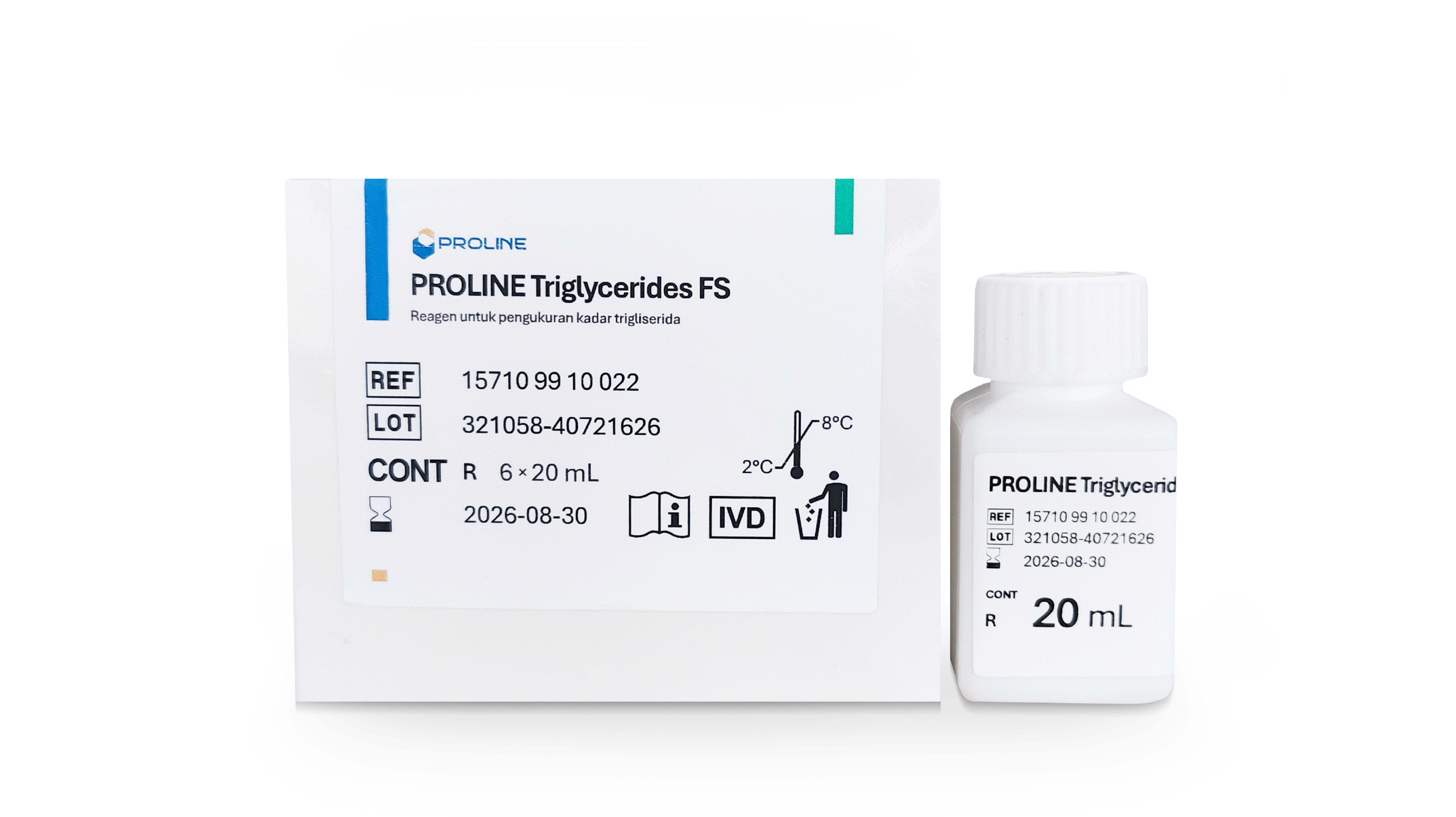PROLINE Triglycerides FS

| Catalogue Number | Reagent Volume | Standard Volume |
| 15710 99 10 923 | 4 x 43 mL | - |
| 15710 99 10 192 | 4 x 60 mL | - |
| 15710 99 10 182 | 4 x 60 mL | - |
| 15710 99 10 022 | 6 x 20 mL | - |
| 15710 99 10 025 | 4 x 80 mL | - |
| 15710 99 10 029 | 4 x 200 mL | - |
| 15710 99 10 027 | 4 x 62,5 mL | 1 x 3 mL |
| 15710 99 10 034 | 5 x 50 mL | 1 x 3 mL |
| 15710 99 10 019 | 2 x 50 mL | - |
| 15710 99 10 039 | 2 x 50 mL | 1 x 3 mL |
| 15710 99 10 023 | 6 x 20 mL | 1 x 3 mL |
| 15710 99 10 026 | 4 x 80 mL | 1 x 3 mL |
| 15710 99 10 024 | 5 x 50 mL | - |
Diagnostic reagent for the quantitative determination of triglycerides in serum or heparin plasma in vitro using a photometric system.
Triglycerides FS is an enzymatic colorimetric test designed to measure triglyceride levels in serum and plasma. Triglycerides are evaluated to assess lipid status, detect atherosclerotic risk, and monitor lipid-lowering therapy. Elevated triglyceride levels, especially when combined with increased low-density lipoprotein (LDL) levels, pose a significantly high risk for coronary heart disease (CHD).
Triglycerides are esters formed from glycerol and three fatty acids, making them the most abundant type of natural fat. In plasma, triglycerides bind with apolipoproteins to form very low-density lipoproteins (VLDL) and chylomicrons. Hypertriglyceridemia (HTG) is a common condition, with a prevalence of approximately 10% in the adult population.
Measuring triglyceride levels is crucial for diagnosing HTG, as it is directly associated with an increased risk of atherosclerotic cardiovascular disease (ASCVD). Additionally, elevated triglyceride levels can contribute to the development of type 2 diabetes mellitus. At extremely high levels, triglycerides can trigger acute pancreatitis.
High triglyceride levels contribute to the development of coronary heart disease (CHD) through the mechanism of atherosclerosis, which involves the formation of plaques in the walls of blood vessels. Elevated triglycerides are often associated with increased very low-density lipoprotein (VLDL) and chylomicron remnants, which are atherogenic in nature. This condition is frequently accompanied by other risk factors such as low HDL levels, insulin resistance, and obesity, further increasing the risk of CHD. Therefore, controlling triglyceride levels is crucial in preventing CHD and other cardiovascular complications.
Using enzymatic colorimetry with glycerol-3-phosphate oxidase (GPO).
- Ready-to-use liquid reagent (open-system) without reconstitution
- Excellent linearity and stability performance
- Available in MPK (Multi-Purpose Kit) and dedicated kit
- Compatible with >65 brands of manual and automated clinical chemistry analyzers
| Sample type | Serum or plasma |
| Measurement range | 3,08 mg/dL - 1300 mg/dL |
| Analysis wavelength | 546 nm |
| Analysis mode | End-Point |
| Reagent volume used (analyzer manual) | 1000 µL |
| Sample volume used (analyzer manual) | 10 µL |
| Storage temperature | 2 – 8 °C |
| Open vial stability | 18 months |
| Expiration date | 24 months |
| Control for Triglyceride Reagent | Calibrator for Triglyceride Reagent |
| TruLab N | TruCal U |
| TruLab P | Triglycerides Standard FS |
| TruLab L Level 1 | |
| TruLab L Level 2 |
| Reference Range: | ||
| mg/dL | mmol/L | |
| Normal | < 150 | < 1,65 |
| Borderline | 150 – 199 | 1,69 – 2,25 |
| High | 200 – 399 | 2,26 – 4,51 |
| Very High | ≥ 400 | ≥ 4,52 |
- Triglycerides Reagent
- Doos
- Kit insert
- Reagents bottle
- Rifai N, Bachorik PS, Albers JJ. Lipids, lipoproteins and apolipoproteins. In: Burtis CA, Ashwood ER, editors. Tietz Textbook of Clinical Chemistry. 3rd ed. Philadelphia: W.B Saunders Company; 1999. p. 809-61.
- Cole TG, Klotzsch SG, McNamara J. Measurement of triglyceride concentration. In: Rifai N, Warnick GR, Dominiczak MH, eds. Handbook of lipoprotein testing. Washington: AACC Press, 1997. p. 115-26.
- Recommendation of the Second Joint Task Force of European and other Societies on Coronary Prevention. Prevention of coronary heart disease in clinical practice. Eur Heart J 1998;19: 1434-503.
- Guder WG, Zawta B et al. The Quality of Diagnostic Samples. 1st ed. Darmstadt: GIT Verlag; 2001; p. 46-7.
- Young DS. Effects of Drugs on Clinical Laboratory Tests. 5th. ed. Volume 1 and 2. Washington, DC: The American Assoiation for Clinical Chemistry Press 2000.
- Bakker AJ, Mücke M. Gammopathy interference in clinical chemistry assays: mechanisms, detection and prevention. Clin Chem Lab Med 2007; 45(9):1240- 1243.
- Brochure : INA
- Atherosclerosis
- Lipid Metabolism
Contact our team to find out more product information and ordering
- Telp : +62 21 8984 2722
- WhatsApp : +62 815 1359 2626
- Email : marketing@proline.co.id
Contact our Technical support team for further assistance with product specifications, services and other technical documents.
- Telp : +62-21-8984-2722
- WhatsApp : +62-817-9324-884
- Email : technical.support@prodis.co.id
